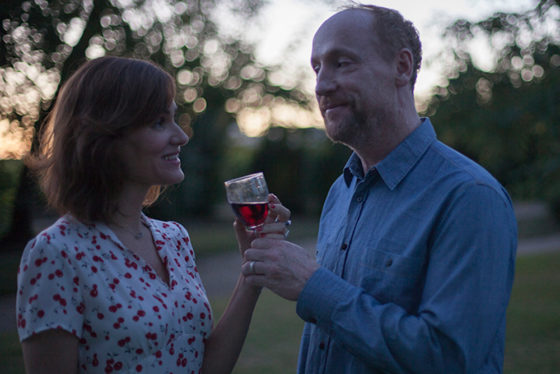

[Rating: Rock Fist Way Down]
Do you remember all the off-beat, indie late 90s/early aughts rom-coms? They were more quirky than funny, and were the original breeding ground for Manic Pixie Dream Girls and meandering conversations and light absurdities instead of plot points. Under the Eiffel Tower is one of those movies – but 20 years too late, void of any charm or interesting characters.
Writer and director Archie Borders (whose previous work is mostly on the festival circuit) took the basic plot from a true story someone told him, named the movie after it, wrote 15 minutes, and then abandoned the project for the remaining hour and 15 minutes.
Matt Walsh (mostly known for Veep and a whole lotta funny roles) has never been less funny, through no fault of his timing or delivery. The script doesn’t give him anything to work with. The only thing that may induce a chuckle is a Balsac/ball sack snicker. That’s the funniest thing that happens.
Walsh plays Stuart, a bored bourbon sales exec who burns out hard and randomly. His friends invite him to France to help him out of his funk, where he misconstrues the behavior of their much younger daughter (Dylan Gelula of The Unbreakable Kimmy Schmidt) and proposes to her … under the Eiffel Tower. And that’s all the action that takes place there, but somehow it warranted the name.

The movie shifts to a buddy road trip, as Stuart is now broke and shamed. He hops onto a train and through a series of uninspired European travel movie tropes (including collecting the world’s most obnoxious Scottish sidekick, played by Reid Scott. He’s from New York and also Veep, and his Scottish accent makes me want to stuff haggis in my ears). The two end up at a vineyard run by the beautiful Louise (Judith Godrèche) and her benefactor (Gary Cole, not doing nearly enough).
And it gets disjointed fast. Apparently Stuart can cook? And he wows over crowds and wins over hearts with his previously unseen skills and willingness to help. Of course, this is when he’s getting to know Louise, and this portion of the movie is filled with cozy, outdoor European dinner scenes (you know, the ones lit by torches or twinkle lights in every. single. movie) that are marred by weird dancing montages set to songs that sounds like the DP’s Sophie-B.-Tucker-worshiping sister wrote them. In reality, I don’t know who it was. I can’t find the info anywhere on IMDb.
Then there is the convoluted attempt at a storyline about Stuart trying to make good professionally by buying the vineyard that Louise hates running, but I guess also that’s bad because she gets pissed about it.
The biggest irritant in this movie is the female characters – they’re all cardboard cut-outs to allow the men to have life experiences. Rosalind is the cut-and-paste of a beautiful, flirty 20-something, and her mother is, of course, constantly screeching about something. Louise is beautiful, but not particularly intelligent or challenging or dimensional or interesting. But she paints so Stuart can show off his painting skills, and she hates her life so Stuart can try to save her from it. It’s almost retro in it’s use of women as props.
These smaller indie romantic comedies are often slow and charming. Somehow, they managed to make one about food and wine and the South of France completely unpalatable.




Comments on this entry are closed.